Squirrel Damage Repair
- Jared Crawford
- Aug 8, 2025
- 5 min read
How to Repair and Avoid Home Damage from Squirrels
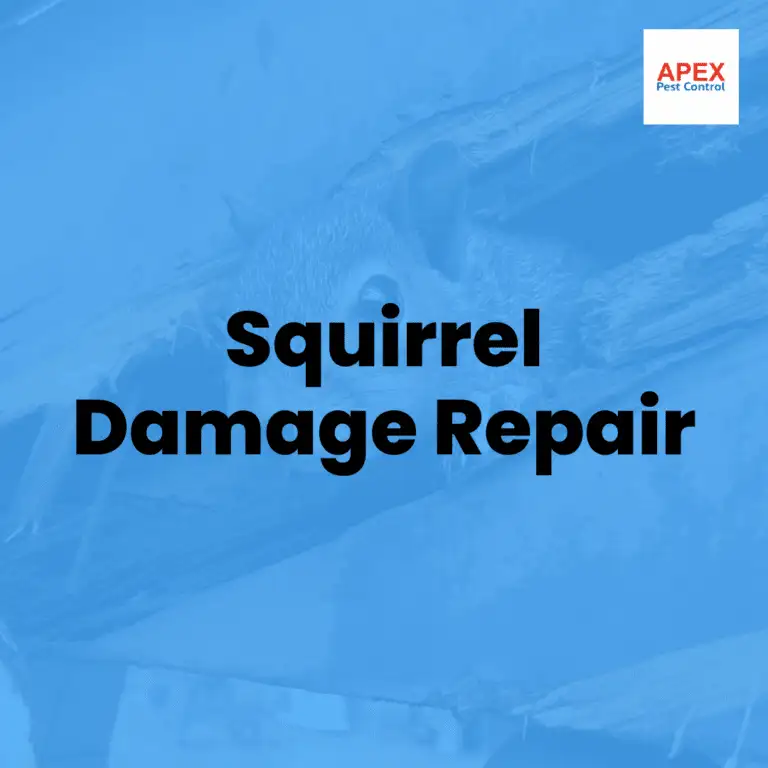
Does your loft sound like it's being scratched at night? It might be the grey squirrels. Due to their ability to chew through cables, build nests in insulation, and disturb gardens, these invasive rodents seriously harm homes in the UK. If their activities are not controlled, they may cause structural problems, health dangers, and fire threats, which might cost homeowners hundreds or thousands of dollars to fix.
This article helps you find squirrel problems, fix damage, and use do-it-yourself or expert methods to protect your property. Manage these pests appropriately to protect your house and help native red squirrels.
How to Spot Squirrel Problems?
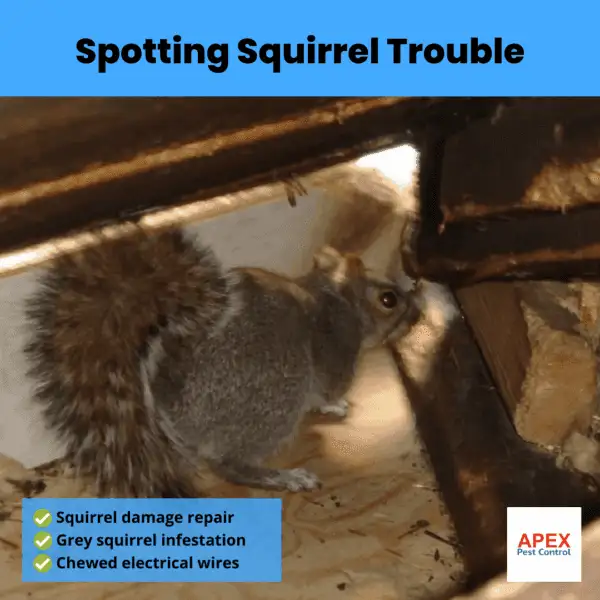
Costly repairs can be avoided by detecting grey squirrels early. To verify an infestation, look for these telltale indicators.
Typical Squirrel Signs
Noises: Scampering, scratching, or gnawing in lofts or walls, especially at dawn and dusk.
Droppings: Larger and rounder than rat droppings, often with a central bulge, found in lofts or gardens.
Damage: Chewed electrical wires, torn insulation, gnawed wood, or holes in roof tiles.
Squirrel Damage Locations
Lofts and Attics: Squirrels nest in high, safe spots, gnawing beams and wires, risking fire and structural damage.
Gardens and Yards: They dig up bulbs, strip bark, and eat seeds, harming plants and trees.
Walls and Insulation: Inside walls, squirrels shred insulation and chew cables, raising energy bills and fire risks.
Health Risks
Health risks could arise from the presence of salmonella and leptospirosis in squirrel urine and droppings. When cleaning up, wear protective gear because breathing in dust from their faeces might damage your lungs.
“If grey squirrels are not dealt with right away, they could become a health hazard in your loft." — Expert in Pest Control, Dr. Jane Smith
Statistic: Homeowners in the UK may have to pay anything from £500 to £30,000 for squirrel damage, with electrical repairs frequently being the most costly.
Assessing the Damage
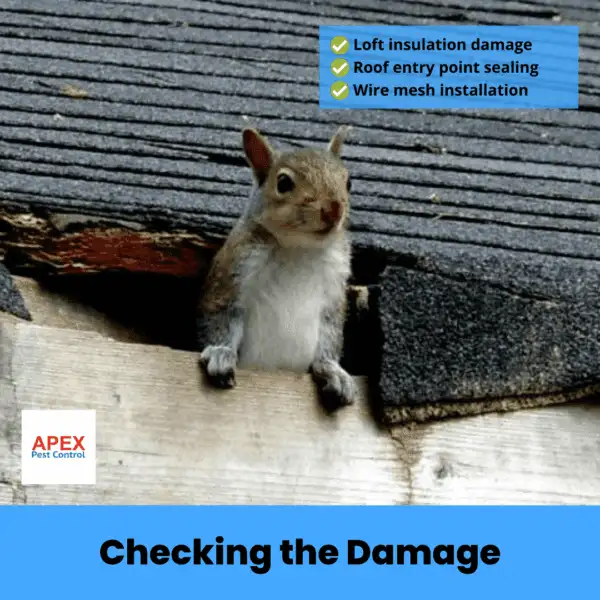
Before choosing to make repairs, it is essential to evaluate squirrel damage. Select between a safe do-it-yourself method or a professional inspection.
Employing a Professional
Reliable inspections are provided by wildlife management specialists.
Why It Helps: Professionals use tools like camera traps to locate hidden nests and entry points, leveraging their expertise in squirrel behaviour.
What They Do: They check lofts for nests, roofs for holes, and wires for chewing, while assessing health risks from droppings.
DIY Inspection
Put safety first when doing do-it-yourself inspections to prevent health hazards.
Stay Safe: Wear gloves and a mask to protect against diseases from droppings or urine.
Where to Look: Inspect lofts, corners, and baseboards indoors; check trees, fences, vents, and soffits outdoors for entry points.
Repairing Damage from Squirrels
Timely repairs stop additional harm. Take these actions to address gardens, access points, insulation, and sanitation.
Sealing Entry Points and Holes
Squirrels take advantage of the little openings. To prevent their re-entry, block them.
Use 16-gauge wire mesh, sheet metal, or hardware cloth to seal roof or wall holes.
Apply caulk for minor gaps, but consult a roofer for significant roof or soffit damage.
Tip: Professionals can install one-way exclusion funnels to allow squirrels to exit without returning.
Insulation Replacement
Energy expenses and health hazards are increased by torn insulation.
As soon as possible, replace any damaged insulation.
To ensure safety, hire experts to clean and disinfect places affected by urine.
Garden Restoration
Prevent squirrel damage to your garden.
Install squirrel-proof bird feeders to secure seeds.
Cover bulbs with galvanised mesh and plant squirrel-resistant species like daffodils or marigolds.
Use fencing or bamboo skewers to deter digging.
Sanitisation and Cleaning
Cleaning carefully is important since squirrel waste spreads diseases.
Use a 1:10 bleach solution or HSE-approved sanitiser on droppings and urine.
Vacuum dust while wearing a mask to avoid inhaling harmful particles.
Professional vs. DIY Squirrel Control
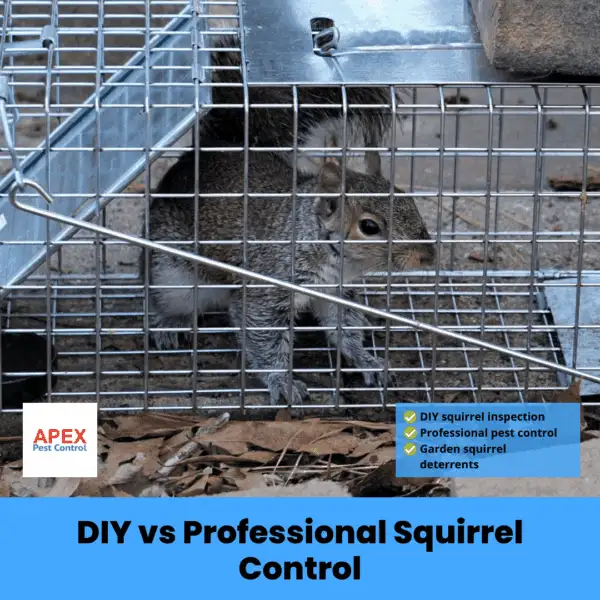
Is it better to hire a professional or handle squirrels yourself? Both options are contrasted in this table.
Method | Pros | Cons |
DIY |
|
|
Professional |
|
|
Statistics: Depending on the extent of the infestation, professional squirrel removal might cost anywhere from £200 to £1,000.
Eliminating Squirrels Permanently
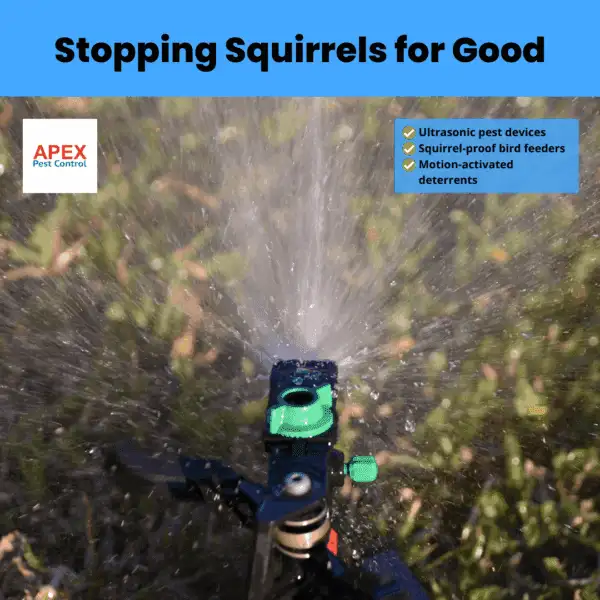
Time and money can be saved by preventing squirrel infestations. Make use of these complying, environmentally responsible actions.
Natural Deterrents
Certain textures and smells are avoided by squirrels.
Spray cayenne pepper and water or plant mint in gardens.
Scatter coffee beans, human hair, or blood meal near plants.
Tip: Reapply after rain for effectiveness.
Commercial Deterrents
Additional protection is provided by store-bought remedies.
Motion-activated sprinklers startle squirrels with water bursts.
Ultrasonic devices emit sounds inaudible to humans but irritating to squirrels.
Frequent Inspections
Infestations are avoided with routine care.
Trim tree branches near roofs to block access.
Inspect vents, chimneys, and eaves for gaps in spring and autumn.
Early action can save £500 to £30,000 by stopping damage early.
Legal Requirements in the UK
According to UK law, grey squirrels are invasive and must be strictly complied with.
The Invasive Alien Species Order 2019 prohibits releasing trapped grey squirrels.
Humane dispatch is mandatory, typically handled by licensed professionals to avoid penalties.
Ecological Note: Controlling grey squirrels protects native red squirrels and woodlands.
When Should You Hire an Expert?
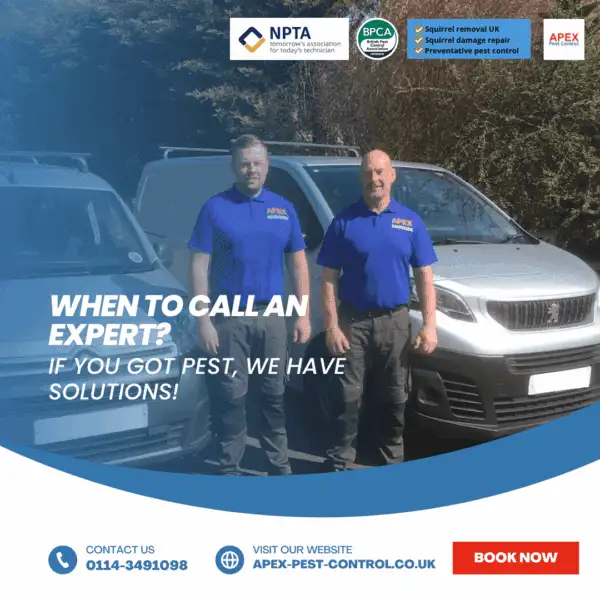
Professional intervention is necessary in certain cases. Speak with a certified pest control professional if you observe:
Weak roofs or walls from gnawed beams.
Chewed electrical wires, increasing fire risk.
Urine-stained ceilings or contaminated water tanks.
Why Experts Are Effective
Experts certified by the BPCA settle disputes in a safe and lawful manner.
They use box traps or one-way doors for humane removal.
They repair damage and provide prevention advice.
They ensure compliance with the Wildlife and Countryside Act 1981 and Wild Mammals (Protection) Act 1996.
Choosing a Provider
Pick an established pest control business.
Look for BPCA or RSPH accreditation, insurance, and positive reviews.
Ask about humane methods and prevention guarantees.
Tip: Confirm they use exclusion funnels for lasting results.
Common Enquiries Regarding Squirrel Damage
What scents put squirrels off?
Grey squirrels stay away from ammonia, chilli pepper, and peppermint oil. Sprays or wet cotton balls should be placed next to plants, lofts, and entryways. If it rains, reapply for optimal effects. Other pest management techniques are enhanced by these non-toxic, compassionate deterrents.
How much does it cost to repair squirrel damage?
Minor insulation repairs cost £500, whereas substantial repairs to asbestos ceilings, wiring, or roof timbers cost £30,000. An expert survey yields a precise estimate.
Are squirrels able to start fires?
Indeed. In order to control tooth growth, squirrels gnaw wires, exposing cables that could arc or ignite and start loft fires. This risk is decreased by routine proofreading and inspections.
Do squirrels pose a health risk to me?
Leptospirosis and salmonella can be found in the urine and droppings of squirrels. For a safe clean-up, use personal protective equipment (PPE) or employ a certified pest controller.
How can I make my garden squirrel-proof?
Use squirrel-proof feeders, grow daffodils, and cover bulbs with galvanised mesh. To limit access, secure compost containers and prune branches close to rooftops.
Is releasing grey squirrels permitted by law?
No, it is illegal to release caught grey squirrels under the 2019 Invasive Alien Species Order. To preserve native animals, they must be sent out humanely by qualified people.
How can I tell if my loft is home to squirrels
At dawn or dusk, listen for gnawing or scratching. Look for nesting materials, chewed wires, or droppings. Their presence is verified by a qualified inspection.




Comments